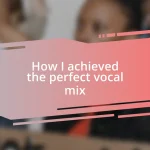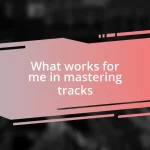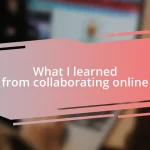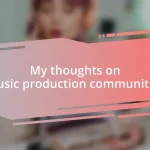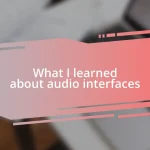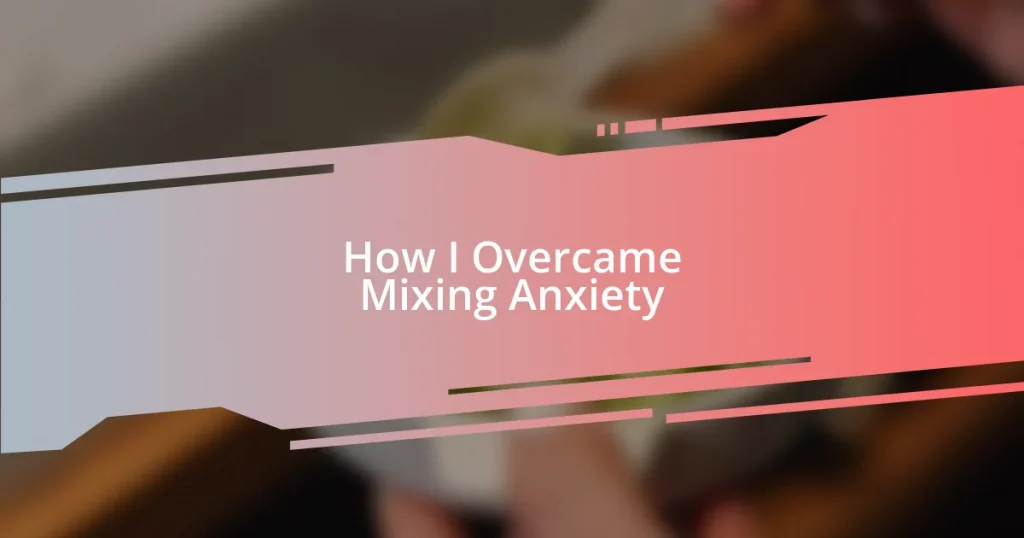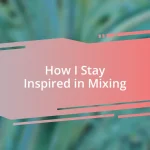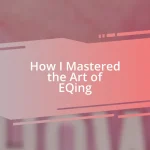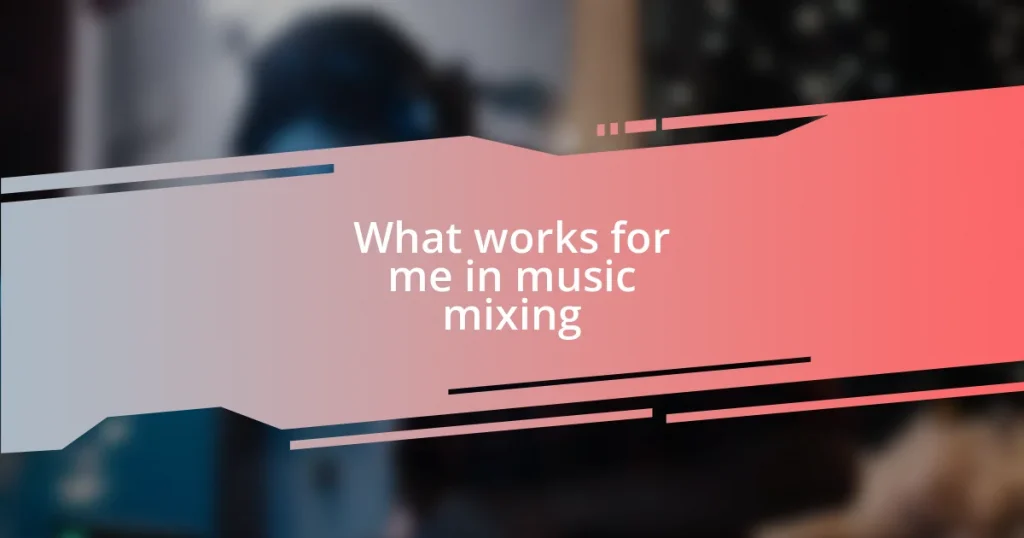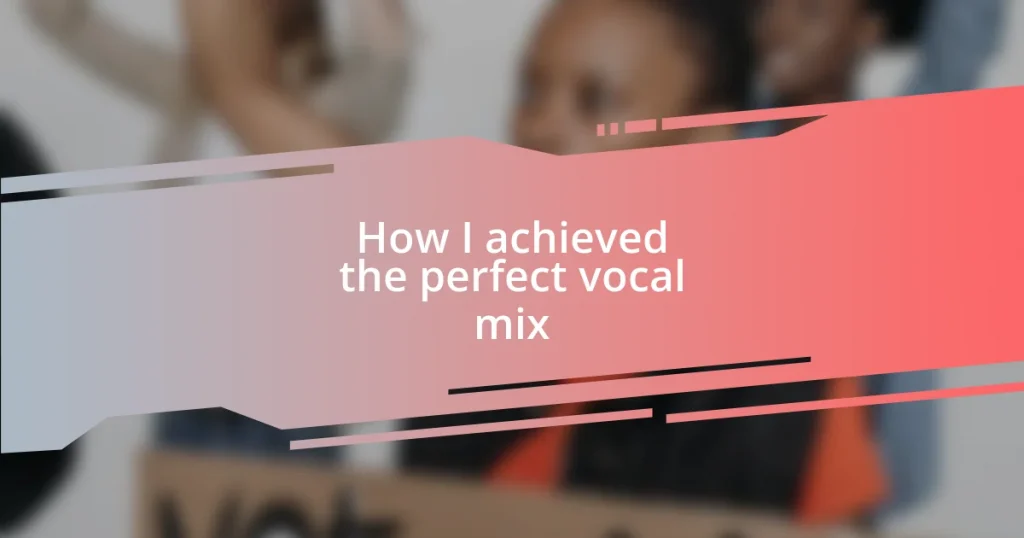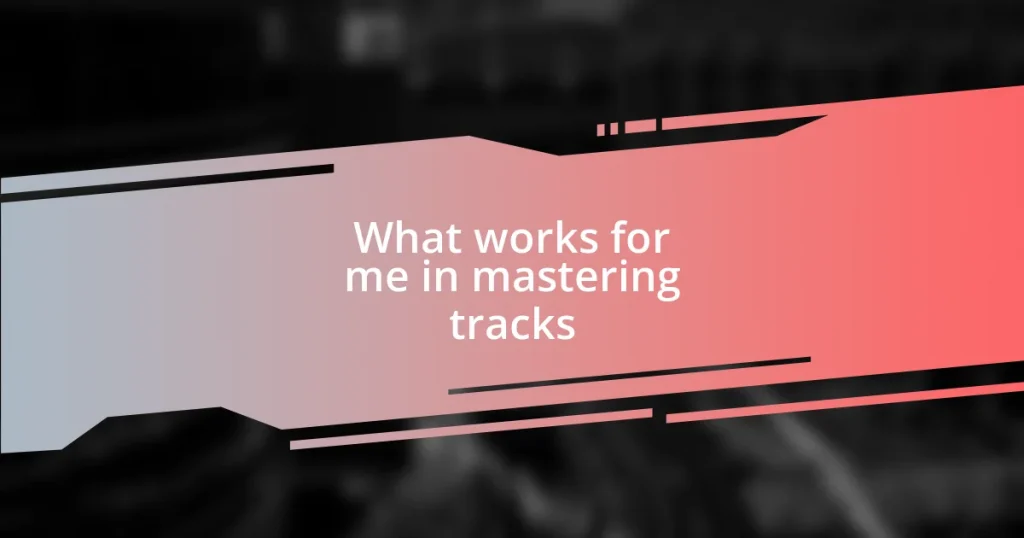Key takeaways:
- Mixing anxiety is a common emotional challenge faced by musicians and producers, often stemming from fear of judgment and self-doubt.
- Recognizing triggers, such as comparison and high-stakes situations, helps in developing strategies to manage anxiety effectively.
- Building confidence involves preparation, celebrating small victories, and seeking support from others to foster connection and resilience.
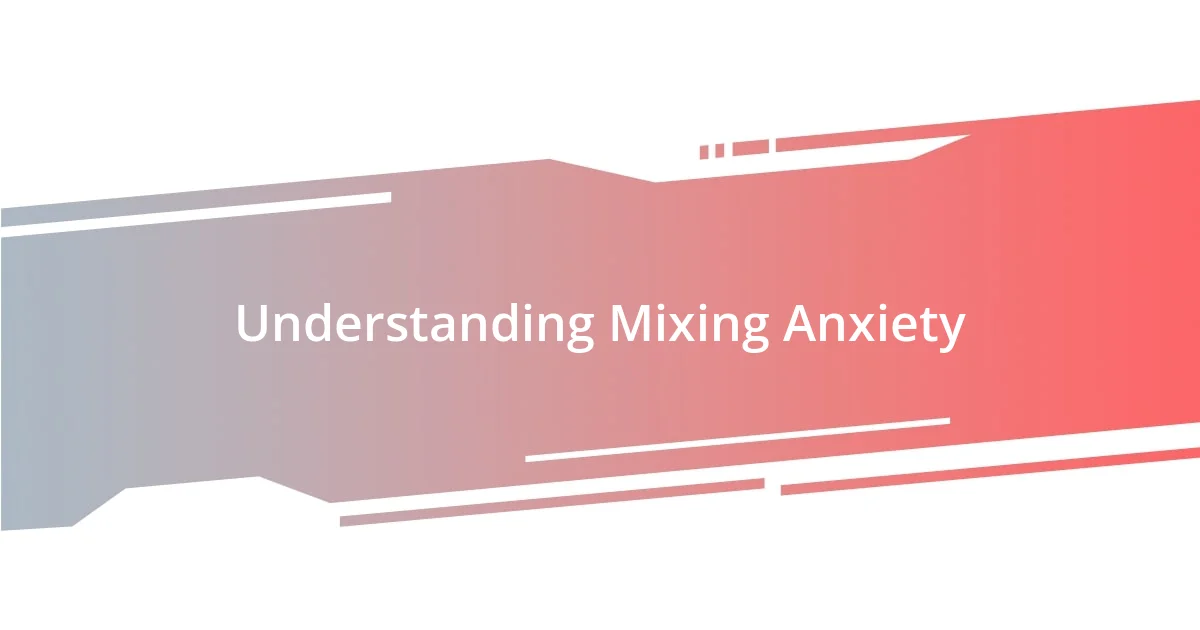
Understanding Mixing Anxiety
Mixing anxiety often feels like standing at the edge of a high dive, peering into the unknown below. I remember my heart racing during my first experience in the studio, surrounded by equipment I barely understood. Why did I feel so overwhelmed? It’s that fear of judgment and the pressure to produce something perfect, which can be paralyzing.
It’s important to acknowledge that mixing anxiety doesn’t just stem from a lack of technical skills; it’s deeply emotional. I once found myself frozen in front of a project, convinced my work was subpar compared to my peers. How many of us have faced that moment of doubt where we question our abilities? This vulnerability can cloud our creativity and create a vicious cycle of fear and self-doubt.
Understanding this anxiety means recognizing it as a common battle among musicians and producers. I’ve often shared with friends that it’s normal to feel this way; even seasoned professionals experience similar feelings. By embracing those nerves as part of the process, we start to dismantle the fear and, ironically, allow ourselves the freedom to explore new ideas.
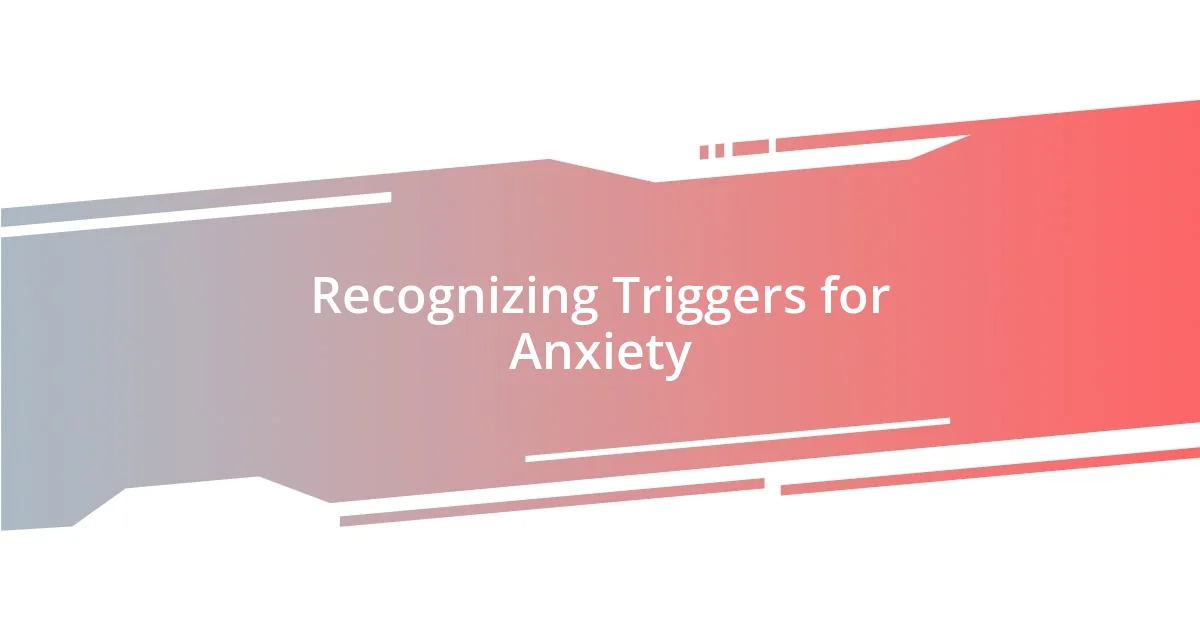
Recognizing Triggers for Anxiety
Recognizing triggers for anxiety is a crucial step in overcoming it. For me, certain scenarios amplified my feelings of unease. I realized that large groups or open critiques would set my heart racing, forcing me to retreat into my shell. By identifying these moments, I could prepare myself mentally, creating a strategy to face them head-on instead of avoiding them.
To better understand what triggers anxiety, consider the following:
- Comparison: Watching others succeed can ignite a fear of inadequacy.
- High-stakes situations: Preparing for a performance or presentation often feels daunting.
- Unfamiliar environments: New settings might evoke feelings of uncertainty and nervousness.
- Past experiences: Negative feedback from previous projects can linger and resurface unexpectedly.
- Social dynamics: Interactions with particularly critical individuals can escalate anxiety levels.
Recognizing these triggers has been transformative for me. Each time I anticipated a challenging situation, I learned to channel that energy into preparation rather than paralysis.
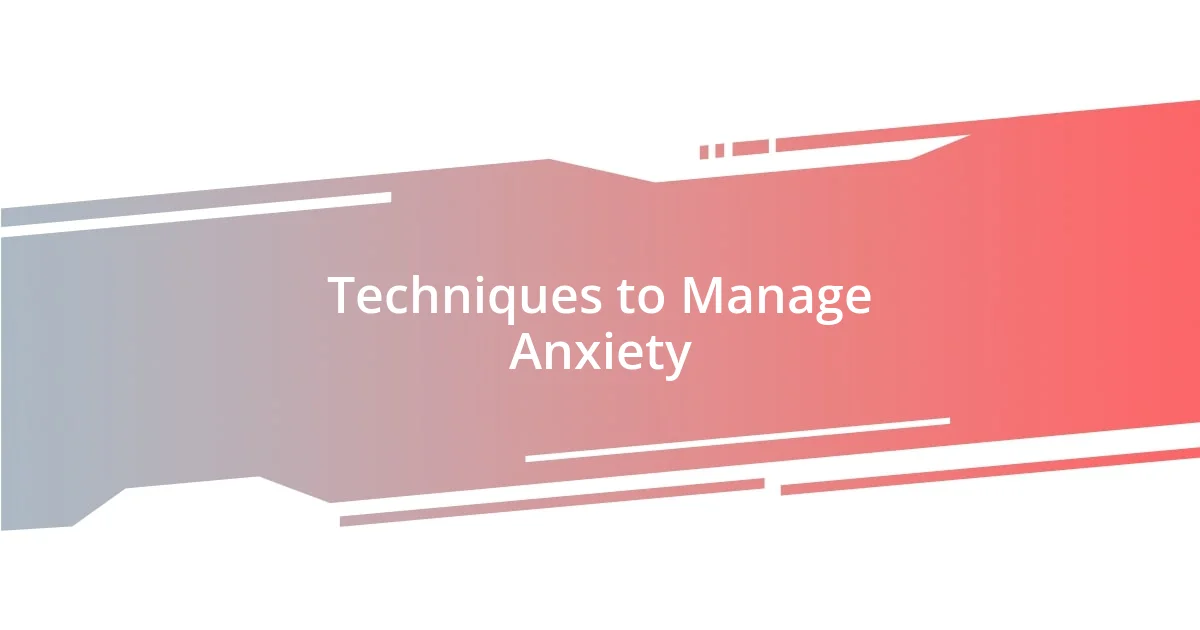
Techniques to Manage Anxiety
Managing anxiety effectively requires a toolbox of techniques that resonate personally. One method I’ve found invaluable is mindfulness meditation. Just the act of sitting quietly and focusing on my breath for a few minutes helps ground me. When I first started, it felt awkward. But over time, I could feel my racing thoughts slow down, making the anxiety more manageable.
Another approach that significantly changed the game for me was visualization. Picture this: before a studio session, I would close my eyes and mentally walk through the process. Imagining every step — from setting up the equipment to the final mix — not only calmed my nerves but also prepared me for what lay ahead. I remember vividly the first time I applied this technique; I walked into the studio feeling almost confident, as if I had already succeeded, which transformed how I approached mixing entirely.
Lastly, breaking tasks into smaller, manageable chunks has been essential. Instead of looking at a full project as an overwhelming mountain to climb, I treat each element like stepping stones. Focusing on one section or effect at a time has helped me engage deeply without feeling crushed by the weight of all that needs to be accomplished. It’s such a relief to check off these mini-goals one by one, gradually building momentum rather than letting anxiety eclipse my creativity.
| Technique | Description |
|---|---|
| Mindfulness Meditation | Helps ground you with breath-focused practice. |
| Visualization | Mental rehearsal of tasks boosts confidence and preparation. |
| Task Breakdown | Divides projects into smaller, manageable chunks. |
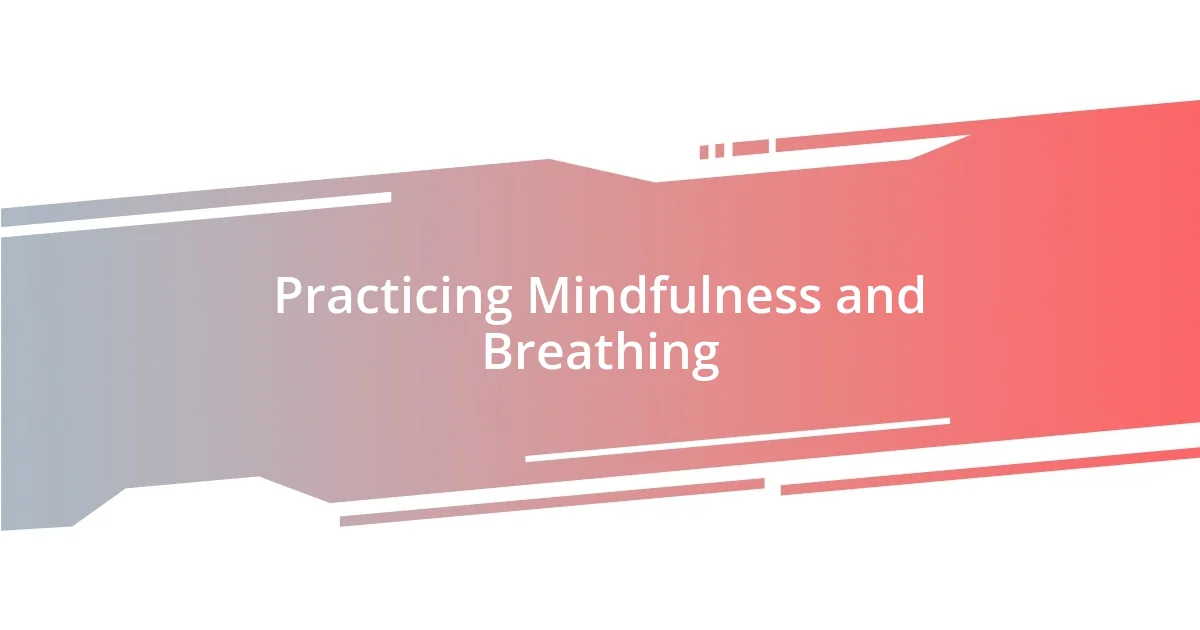
Practicing Mindfulness and Breathing
Practicing mindfulness and breathing was one of the first steps I took to tackle my anxiety. Initially, I felt silly sitting with my eyes closed and focusing solely on my breath. However, as I committed to this daily practice, I discovered a tranquil space within myself. It was like stumbling upon a hidden gem; in those moments of peace, I could hear my own thoughts more clearly, allowing me to process my emotions without the overwhelming noise of anxiety swirling around.
One breathing technique that really resonated with me is the four-seven-eight method. It’s simple yet powerful: inhale for four counts, hold for seven, and exhale for eight. I remember one particularly nerve-wracking studio session when I felt the familiar knot of anxiety tightening in my chest. I closed my eyes, practiced this breathing pattern, and felt a wave of calm wash over me. It occurred to me then: isn’t it amazing how something as natural as breathing can give us a sense of control over our inner chaos?
Mindfulness didn’t just help me during those stressful moments; it became an integral part of my daily life. I began infusing it into routine activities like mixing or even just sipping my morning coffee. This practice taught me to be present, to truly savor each experience without the incessant worry about the future. I often found myself asking, “What if I just enjoyed this moment?” That shift in perspective brought me joy, transforming anxiety into clarity and focus.
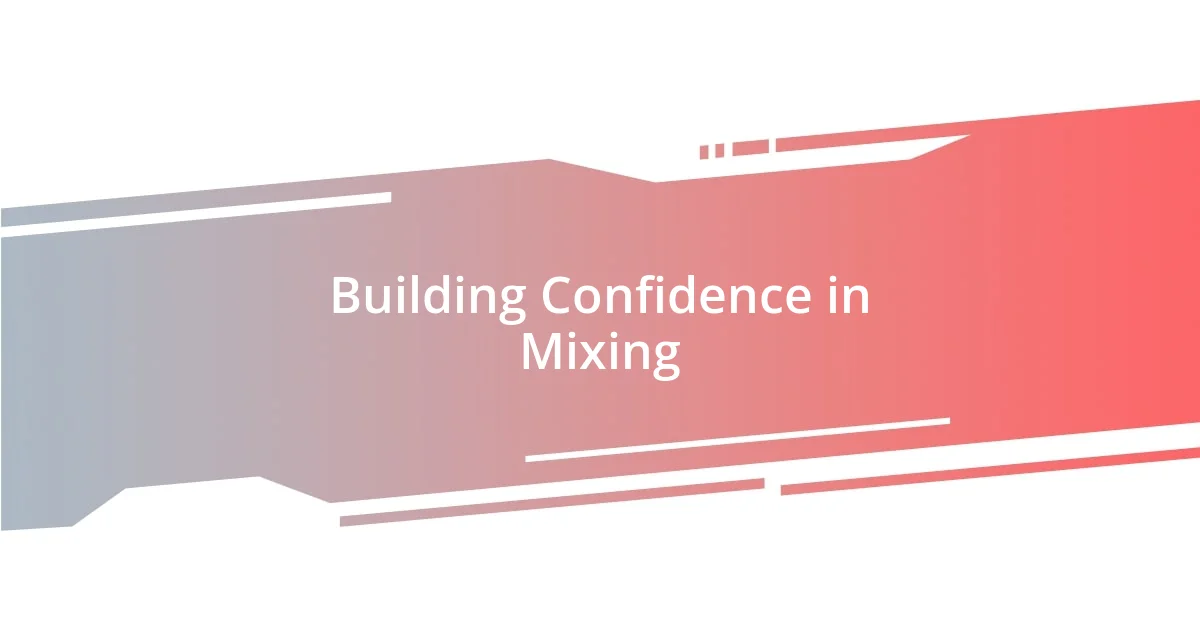
Building Confidence in Mixing
Building confidence in mixing has been an ongoing journey for me, rooted in my experiences in the studio. One pivotal moment that stands out was when I decided to invite a trusted friend to my mixing sessions. Their presence not only provided moral support but also allowed for an enlightening exchange of ideas. I remember the first time I played my mix for them; I was filled with trepidation, but their genuine enthusiasm made me realize that confidence can be nurtured through connection.
I’ve also learned that preparation plays a crucial role in boosting my confidence. Prior to mixing, I now dedicate time to familiarize myself with the materials I’ll be working with, be it the song’s structure or the sounds I plan to manipulate. This preparation feels like laying a solid foundation; when I walk into the session, I carry that knowledge like armor. Can you imagine stepping into a project unprepared? I certainly can, and it’s a feeling I’ve worked hard to outgrow.
In my experience, celebrating small victories has been a game changer. After each session, I take a moment to reflect on what I did well, whether it was a particularly smooth transition or a sound that blended perfectly. I’ve started jotting these wins down in a journal, and it’s uplifting to see how my confidence grows over time. It makes me wonder, what if we all recognized and acknowledged our accomplishments, no matter how minor? That simple practice of reflecting on success has transformed my outlook on mixing, reminding me that progress is often found in the small details.
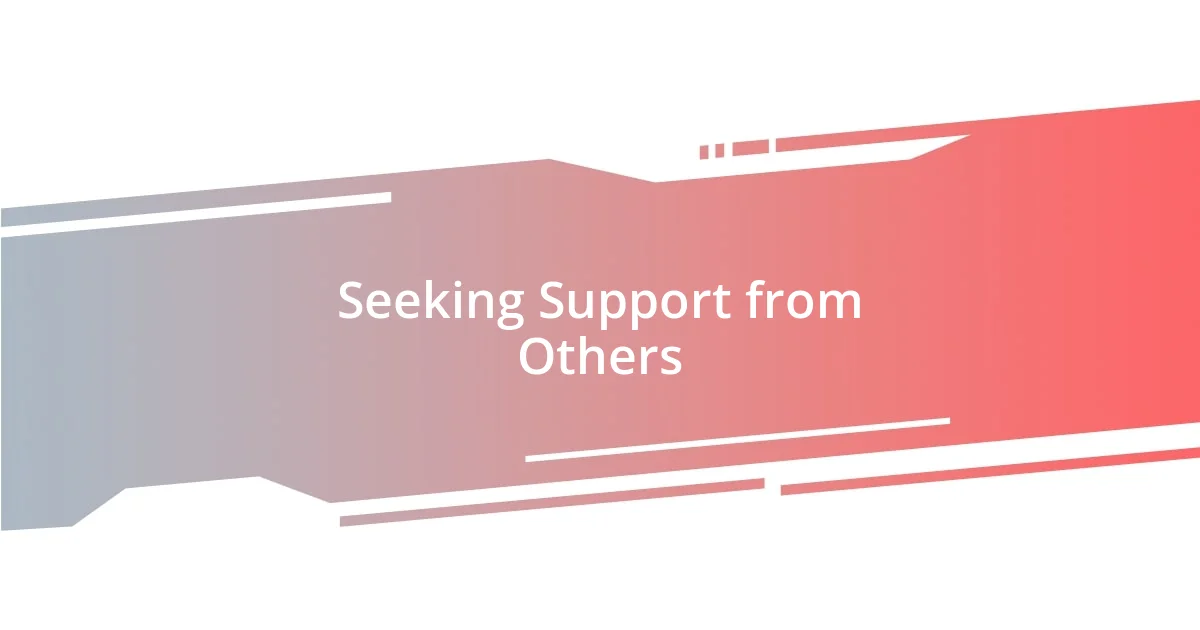
Seeking Support from Others
Reaching out to others for support was a lifeline during my struggle with anxiety. I vividly remember a specific instance when I felt paralyzed by fear before a big mixing project. Instead of isolating myself, I decided to call a fellow producer who had faced similar challenges. His encouragement and shared experiences reminded me that I wasn’t alone in this journey; together, we laughed about our past mistakes, which definitely lightened my mental load.
I’ve also found that sharing my feelings with friends who truly understand the industry can be remarkably cathartic. There were late-night talks where I would spill my anxieties like a messy palette, and in those moments, I felt a weight lift. It’s funny how just articulating those fears made them seem less daunting. Have you ever noticed how opening up creates a bond? It’s as if we forge these invisible threads of support that wrap around us, fortifying our resolve to face our challenges.
Moreover, attending workshops and networking events has been a game changer. One night at a meetup, I found myself confiding in a stranger who eventually became a dear friend. Reflecting on that encounter, I realized how sharing our vulnerabilities can spark genuine connections. I often ask myself, how different would my journey be if I hadn’t taken that leap to connect with others? It’s a fascinating thought that reminds me of the power of community in overcoming personal doubts and fears.
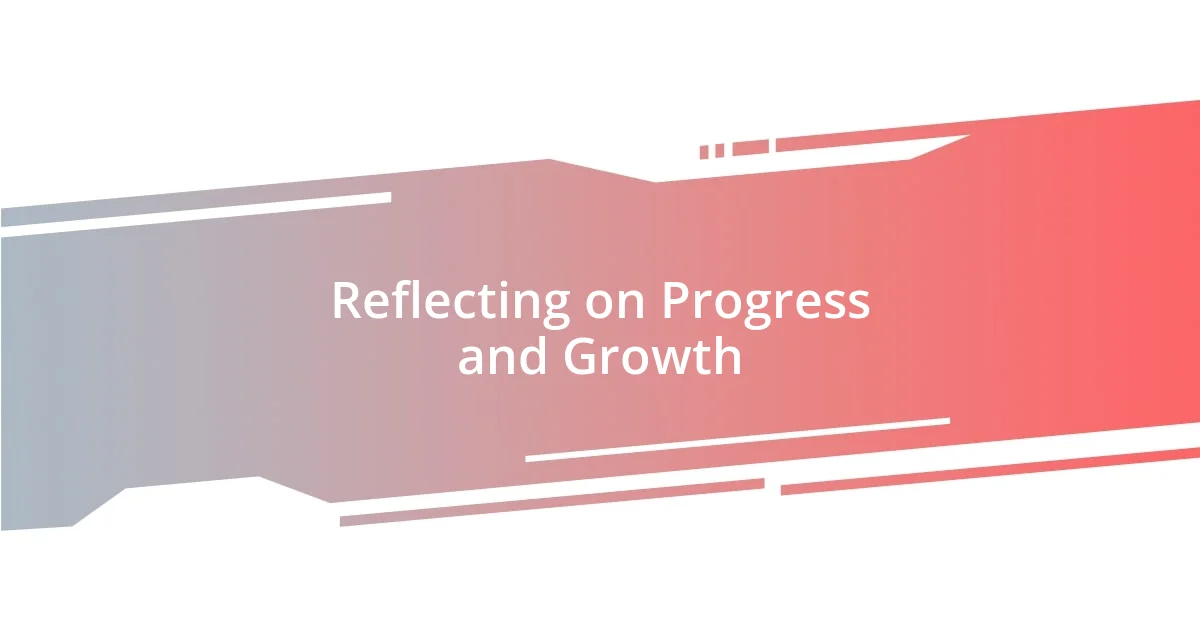
Reflecting on Progress and Growth
Reflecting on my progress and growth has been enlightening. I still recall the palpable mix of fear and exhilaration I felt the first time I mixed in front of a crowd. Just a few years ago, the thought would have made my stomach churn; however, standing there, I felt not just a sense of accomplishment but a profound connection with the audience. Isn’t it fascinating how much can change simply by facing our fears?
Another memory that stands out is from a particularly rough mixing session that went completely awry. I remember sitting with my headphones on, feeling utterly defeated as nothing seemed to click. Instead of spiraling into negative thoughts, I took a moment to breathe and reflect on the lessons learned from that experience. That shift in perspective allowed me to view setbacks not as failures but as vital parts of my growth journey. How often do we allow ourselves to learn from our mistakes instead of seeing them as roadblocks?
As I look back on these moments, I’m struck by how essential reflection has been to my development. I often find myself journaling about my experiences, capturing the highs and lows, which serve as reminders of my resilience. Embracing the journey feels liberating, doesn’t it? The more I acknowledge each step, the clearer it becomes that my path is not just about technical skill but also about personal evolution. Each reflection becomes a building block, reinforcing my confidence and lighting the way forward.

